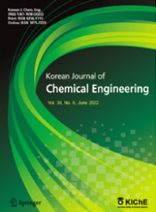Articles & Issues
- Language
- English
- Conflict of Interest
- In relation to this article, we declare that there is no conflict of interest.
-
 This is an Open-Access article distributed under the terms of the Creative Commons Attribution Non-Commercial License (http://creativecommons.org/licenses/bync/3.0) which permits
unrestricted non-commercial use, distribution, and reproduction in any medium, provided the original work is properly cited.
This is an Open-Access article distributed under the terms of the Creative Commons Attribution Non-Commercial License (http://creativecommons.org/licenses/bync/3.0) which permits
unrestricted non-commercial use, distribution, and reproduction in any medium, provided the original work is properly cited.
Copyright © KIChE. All rights reserved.
All issues
ROLES OF Pt AND ALUMINA DURING THE COMBUSTION OF COKE DEPOSITS ON PROPANE DEHYDROGENATION CATALYSTS
Korean Journal of Chemical Engineering, September 1998, 15(5),
10.1007/BF02707096
10.1007/BF02707096
 Download PDF
Download PDF
Abstract
Temperature programmed oxidation of coke deposited on Pt based Propane dehydrogenation catalysts reveals that the deposited coke can be categorised into three groups according to their burning temperatures. When coke was separated from the catalyst, however, only one TPO peak could be observed. Experimental results suggest that γ-Al2O3 enhances the coke burning process by increasing coke surface area contacts to oxygen. Pt may also act as a catalyst for the coke combustion reaction. Experiments also show that changing dehydrogenation reaction temperature, variation of H2/HC ratios, addition of only Sn or Sn and an alkali metal (Li, Na and K) can significantly affect the amount of each coke formed. Sample weight used in the temperature programmed oxidation (TPO) experiment also affects the resolution of TPO spectrum.
References
Atchara S, "Combustion of Coke on Dehydrogenation Catalysts," M. Eng. Theses, Chulalongkorn University (1995)
Barbier JB, Corro G, Zhang Y, Appl. Catal., 13, 245 (1985)
Barbier JB, Marecot P, Martin N, Elassal L, Maurel R, "Selective Poisoning by Coke Formation on Pt/Al2O3," Catalyst Deactivation (Delmon, B. and Froment, G.F. eds), Elsevier, Amsterdam, p. 53 (1980)
Bartholdy J, Zeuthen P, Massoth FE, Appl. Catal. A: Gen., 129(1), 33 (1995)
Biswas J, Gray PG, Do DD, Appl. Catal., 32, 249 (1987)
Bualom J, "Effect of Alkali Metals in Dehydrogenation Catalysts for Coke Reduction," M. Eng. Theses, Chulalongkorn University (1995)
Carlos LP, Jose MP, Ind. Eng. Chem. Res., 28, 1785 (1989)
Larsson M, Hulten M, Blekkan EA, Andersson B, J. Catal., 164(1), 44 (1996)
Liwu L, Tao Z, Jingling Z, Zhusheng Z, Appl. Catal., 67, 11 (1990)
Marecot P, Akhachane A, Barbier J, Catal. Lett., 36(1-2), 37 (1996)
Nonglak P, "Characterization of Coke on Dehydrogenation Catalysts," M. Eng. Theses, Chulalongkorn University (1996)
Pieck CL, Jablonski EL, Verderone RJ, Parera JM, Appl. Catal., 56, 1 (1989)
Querini CA, Fung SC, Catal. Today, 37(3), 277 (1997)
Querini CA, Fung SC, Appl. Catal. A: Gen., 117(1), 53 (1994)
Reyes P, Oportus M, Pecchi G, Frety R, Moraweck B, Catal. Lett., 37(3-4), 193 (1996)
Silipoln K, "Determination of Irreversible Coke Deposition of Platinum Active Site of Propane Dehydrogenation Catalyst," D. Eng. Theses, Chulalongkorn University (1995)
Tao Z, Jingling Z, Liwu L, "Relation Between Surface Structure and Carbon Deposition on Pt/Al2O3 and Pt-Sn/Al2O3 Catalysts," Studies in Surface Science and Catalyst, Elsevier, Amsterdam, 34, 143 (1991)
Barbier JB, Corro G, Zhang Y, Appl. Catal., 13, 245 (1985)
Barbier JB, Marecot P, Martin N, Elassal L, Maurel R, "Selective Poisoning by Coke Formation on Pt/Al2O3," Catalyst Deactivation (Delmon, B. and Froment, G.F. eds), Elsevier, Amsterdam, p. 53 (1980)
Bartholdy J, Zeuthen P, Massoth FE, Appl. Catal. A: Gen., 129(1), 33 (1995)
Biswas J, Gray PG, Do DD, Appl. Catal., 32, 249 (1987)
Bualom J, "Effect of Alkali Metals in Dehydrogenation Catalysts for Coke Reduction," M. Eng. Theses, Chulalongkorn University (1995)
Carlos LP, Jose MP, Ind. Eng. Chem. Res., 28, 1785 (1989)
Larsson M, Hulten M, Blekkan EA, Andersson B, J. Catal., 164(1), 44 (1996)
Liwu L, Tao Z, Jingling Z, Zhusheng Z, Appl. Catal., 67, 11 (1990)
Marecot P, Akhachane A, Barbier J, Catal. Lett., 36(1-2), 37 (1996)
Nonglak P, "Characterization of Coke on Dehydrogenation Catalysts," M. Eng. Theses, Chulalongkorn University (1996)
Pieck CL, Jablonski EL, Verderone RJ, Parera JM, Appl. Catal., 56, 1 (1989)
Querini CA, Fung SC, Catal. Today, 37(3), 277 (1997)
Querini CA, Fung SC, Appl. Catal. A: Gen., 117(1), 53 (1994)
Reyes P, Oportus M, Pecchi G, Frety R, Moraweck B, Catal. Lett., 37(3-4), 193 (1996)
Silipoln K, "Determination of Irreversible Coke Deposition of Platinum Active Site of Propane Dehydrogenation Catalyst," D. Eng. Theses, Chulalongkorn University (1995)
Tao Z, Jingling Z, Liwu L, "Relation Between Surface Structure and Carbon Deposition on Pt/Al2O3 and Pt-Sn/Al2O3 Catalysts," Studies in Surface Science and Catalyst, Elsevier, Amsterdam, 34, 143 (1991)

